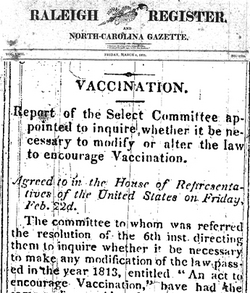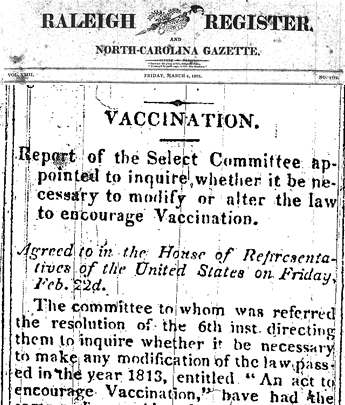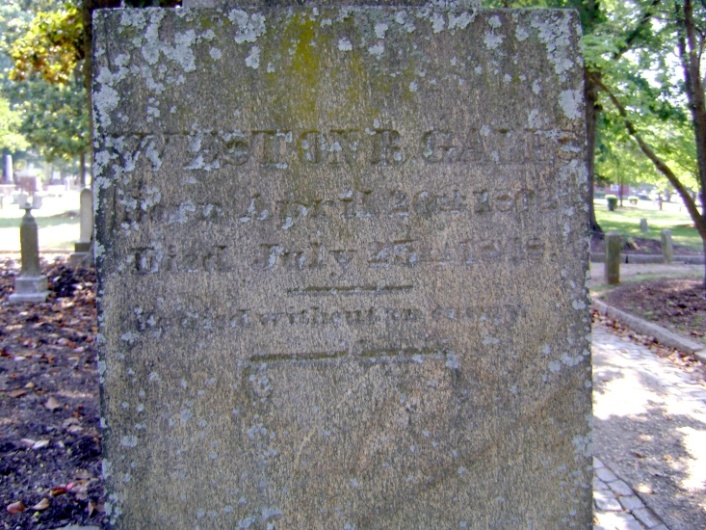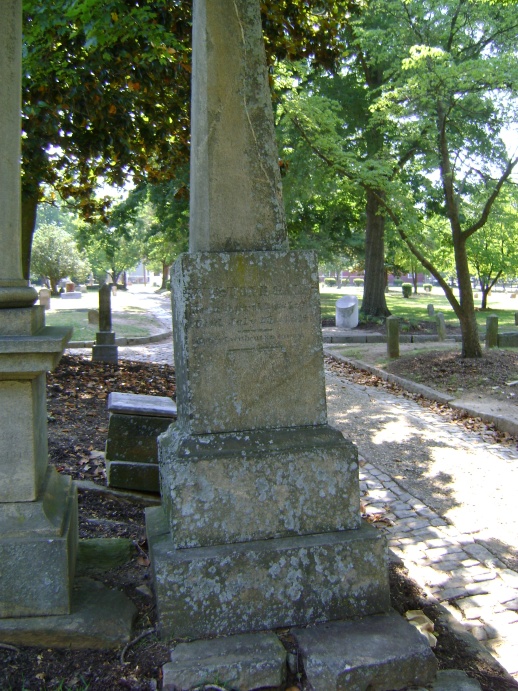His parents were born in England, both liberals and unabashed free thinkers, and early converts to Unitarianism, who became became active in the constitutional reform movement in the late 1780's, expressing their ideas in their weekly newspaper, the Sheffield Register. In 1791, Gales helped launch the Sheffield Society for Constitutional Information, an organization dedicated to "the enlightenment of the people" in their need for political and labor reform, serving several times as chairman. When war broke out between France and Great Britain in 1793, those engaged in reform activities came under the surveillance of government authorities. The habeas corpus act was suspended, a committee in the House of Commons launched a heresy hunt for those suspected of treason, and a number of reformers were arrested. Joseph Gales fled to Germany and the rest of the family met up with him, and finally immigrated to Philadelphia in 1795 where he started the Independent Gazetteer espousing the views of the Jeffersonian Republicans. It was in Germany that his daughter, Altona Gales was born, who would later marry the Unitarian minister, Rev. Anthony Forster, also buried in City Cemetery.
Early in 1798, Gales was approached by certain members of the North Carolina delegation to Congress about locating in Raleigh. Nathaniel Macon, in particular, recognized in Gales the type of editor needed by Republicans in North Carolina. With the crucial election of 1800 approaching and the party in need of a forceful editor to promote the Jefferson cause, Macon and his friends urged Gales to move to Raleigh, the state's new capital, and begin a newspaper. As an inducement he was promised the state printing contract. Pleased with the idea, the family arrived in 1799, and Gales soon started the Raleigh Register and North-Carolina Weekly Advertiser.
Gales ran the Raleigh Register alone until 1821, when he brought his youngest son Weston into the firm as a partner. Weston, born in Raleigh in 1803, had been expelled from Yale. Like his older brother Joseph, he had found college life uncongenial. On 18 Nov. 1823 the two Galeses began publishing the Register as a semiweekly, the first to appear in North Carolina. Gales had issued the Register semiweekly during the session of the General Assembly in 1804, but on a temporary basis only. However, the twice-weekly schedule proved unsatisfactory because North Carolina's population was too sparse to support it. Therefore on 11 Nov. 1831 the Register reverted to weekly publication.
A semiweekly publication was but one of the many innovations made by Joseph Gales in newspaper publishing in North Carolina. Not the least was the verbatim accounts of speeches delivered in the halls of Congress and the chambers of the state capitol. Many a famous speech was saved from oblivion by the shorthand reporting of Gales. He taught the art to his sons Joseph, Jr., and Weston, his son-in-law William W. Seaton, and a number of apprentices. E. J. Hale, longtime editor of the Fayetteville Observer, learned his trade as a printer and reporter from Joseph Gales.
But Gales did more. He used the columns of the Register to promote improvement and reform within Raleigh and North Carolina. Before the Register was a month old, Gales advocated a medical society for the state as a means of combating "the fatal and criminal practices of Quacks and Empyrics." The "bloodthirsty and lawless" custom of dueling he opposed as "repugnant to religion, justice & mercy." Education also enlisted Gales's interest, as it had when he edited the Sheffield Register. Not only did he champion the cause of schools in his paper, but also in 1801 he was one of the incorporators of the Raleigh Academy, which opened in 1804. Libraries, too, were high on Gales's list of needs for society. He declared on one occasion that a public library would go further "to improve the condition of society than any other means that could be devised."
In 1834, the veteran editor had already retired to Washington, DC to be with his son, Joseph Gales, Jr., co-editor and owner with his brother-in-law, William Winston Seaton, of that powerful journal, the National Intelligencer. He also became treasurer of the National Organization, which fought for the emancipation and repatriation of slaves to Africa. Gales died in Raleigh in 1841.
Weston married Lovey Swain Freeman March 12, 1825 in Sandwich, Massachusetts. The couple had 4 children: Major Seaton Gales (CSA), Anna Freeman Gales, Altona Forster Gales and Weston Raleigh Gales Jr. who died as a toddler in 1835. At the age of 36, Weston Gales became sole owner of the Register and a leading citizen in Raleigh. His bride, Lovey, died in 1842 at the age of 37.
Weston married a second time to Mary Spies on January 8, 1844 in New York City. They were the parents of two sons, Weston Spies Gales and Joseph Gales.
Weston Raleigh Gales died unexpectedly at the age of 45. Several newspaper accounts detail his death as July 23rd, 1848. One states that he had been in Old Point Comfort for about 2 weeks in hopes of improving his health. He made it back as far as Petersburg on the evening of July 22nd, but died in the early morning hours of July 23rd. His body was brought back to Raleigh on the 'cars' (train) arriving Monday, July 25th.
The Register now passed into the youthful hands of Weston Gales' 20-year old son, Seaton, who conducted it until November, 1856.
Weston R. Gales' monument in City Cemetery leans precariously on its tilted and cracked foundation. It is not known whether the damage is due to the ravages of time, or the terrible flooding following Hurricane Floyd in 1999.
His parents were born in England, both liberals and unabashed free thinkers, and early converts to Unitarianism, who became became active in the constitutional reform movement in the late 1780's, expressing their ideas in their weekly newspaper, the Sheffield Register. In 1791, Gales helped launch the Sheffield Society for Constitutional Information, an organization dedicated to "the enlightenment of the people" in their need for political and labor reform, serving several times as chairman. When war broke out between France and Great Britain in 1793, those engaged in reform activities came under the surveillance of government authorities. The habeas corpus act was suspended, a committee in the House of Commons launched a heresy hunt for those suspected of treason, and a number of reformers were arrested. Joseph Gales fled to Germany and the rest of the family met up with him, and finally immigrated to Philadelphia in 1795 where he started the Independent Gazetteer espousing the views of the Jeffersonian Republicans. It was in Germany that his daughter, Altona Gales was born, who would later marry the Unitarian minister, Rev. Anthony Forster, also buried in City Cemetery.
Early in 1798, Gales was approached by certain members of the North Carolina delegation to Congress about locating in Raleigh. Nathaniel Macon, in particular, recognized in Gales the type of editor needed by Republicans in North Carolina. With the crucial election of 1800 approaching and the party in need of a forceful editor to promote the Jefferson cause, Macon and his friends urged Gales to move to Raleigh, the state's new capital, and begin a newspaper. As an inducement he was promised the state printing contract. Pleased with the idea, the family arrived in 1799, and Gales soon started the Raleigh Register and North-Carolina Weekly Advertiser.
Gales ran the Raleigh Register alone until 1821, when he brought his youngest son Weston into the firm as a partner. Weston, born in Raleigh in 1803, had been expelled from Yale. Like his older brother Joseph, he had found college life uncongenial. On 18 Nov. 1823 the two Galeses began publishing the Register as a semiweekly, the first to appear in North Carolina. Gales had issued the Register semiweekly during the session of the General Assembly in 1804, but on a temporary basis only. However, the twice-weekly schedule proved unsatisfactory because North Carolina's population was too sparse to support it. Therefore on 11 Nov. 1831 the Register reverted to weekly publication.
A semiweekly publication was but one of the many innovations made by Joseph Gales in newspaper publishing in North Carolina. Not the least was the verbatim accounts of speeches delivered in the halls of Congress and the chambers of the state capitol. Many a famous speech was saved from oblivion by the shorthand reporting of Gales. He taught the art to his sons Joseph, Jr., and Weston, his son-in-law William W. Seaton, and a number of apprentices. E. J. Hale, longtime editor of the Fayetteville Observer, learned his trade as a printer and reporter from Joseph Gales.
But Gales did more. He used the columns of the Register to promote improvement and reform within Raleigh and North Carolina. Before the Register was a month old, Gales advocated a medical society for the state as a means of combating "the fatal and criminal practices of Quacks and Empyrics." The "bloodthirsty and lawless" custom of dueling he opposed as "repugnant to religion, justice & mercy." Education also enlisted Gales's interest, as it had when he edited the Sheffield Register. Not only did he champion the cause of schools in his paper, but also in 1801 he was one of the incorporators of the Raleigh Academy, which opened in 1804. Libraries, too, were high on Gales's list of needs for society. He declared on one occasion that a public library would go further "to improve the condition of society than any other means that could be devised."
In 1834, the veteran editor had already retired to Washington, DC to be with his son, Joseph Gales, Jr., co-editor and owner with his brother-in-law, William Winston Seaton, of that powerful journal, the National Intelligencer. He also became treasurer of the National Organization, which fought for the emancipation and repatriation of slaves to Africa. Gales died in Raleigh in 1841.
Weston married Lovey Swain Freeman March 12, 1825 in Sandwich, Massachusetts. The couple had 4 children: Major Seaton Gales (CSA), Anna Freeman Gales, Altona Forster Gales and Weston Raleigh Gales Jr. who died as a toddler in 1835. At the age of 36, Weston Gales became sole owner of the Register and a leading citizen in Raleigh. His bride, Lovey, died in 1842 at the age of 37.
Weston married a second time to Mary Spies on January 8, 1844 in New York City. They were the parents of two sons, Weston Spies Gales and Joseph Gales.
Weston Raleigh Gales died unexpectedly at the age of 45. Several newspaper accounts detail his death as July 23rd, 1848. One states that he had been in Old Point Comfort for about 2 weeks in hopes of improving his health. He made it back as far as Petersburg on the evening of July 22nd, but died in the early morning hours of July 23rd. His body was brought back to Raleigh on the 'cars' (train) arriving Monday, July 25th.
The Register now passed into the youthful hands of Weston Gales' 20-year old son, Seaton, who conducted it until November, 1856.
Weston R. Gales' monument in City Cemetery leans precariously on its tilted and cracked foundation. It is not known whether the damage is due to the ravages of time, or the terrible flooding following Hurricane Floyd in 1999.
Family Members
Advertisement
Advertisement
















